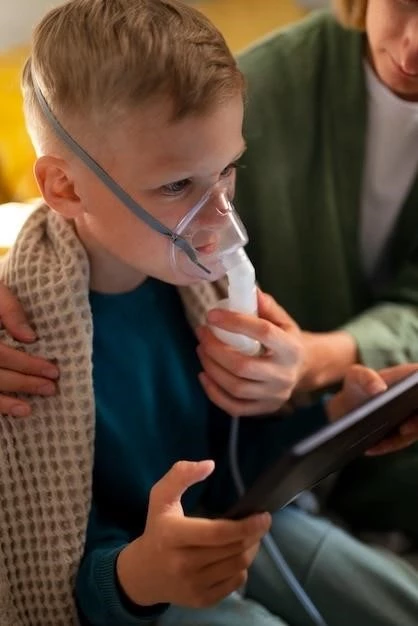Causes of Aarskog Syndrome
Genetic Mutations
Aarskog Syndrome is primarily caused by mutations in the FGD1 gene. These mutations affect the proper function of the protein encoded by the FGD1 gene‚ leading to the characteristic symptoms of the syndrome.
X-Linked Inheritance
Aarskog Syndrome follows an X-linked inheritance pattern. This means the gene responsible for the syndrome is located on the X chromosome. As a result‚ the condition can affect males more severely than females.
Symptoms of Aarskog Syndrome in Children
Physical Characteristics
Children with Aarskog Syndrome may exhibit distinctive facial features‚ such as a broad forehead‚ widow’s peak hairline‚ and wide-set eyes. Additionally‚ they may have short stature and hand and feet abnormalities.
Developmental Delays
Children with Aarskog Syndrome may experience delays in the development of motor skills‚ speech‚ and cognitive abilities. Early intervention and therapy can help address these delays and support overall development.
Genetic Inheritance of Aarskog Syndrome
Role of the FGD1 Gene
Mutations in the FGD1 gene disrupt normal cellular function‚ contributing to the development of Aarskog Syndrome. This gene provides instructions for producing a protein essential for various cellular processes‚ and alterations can lead to the characteristic features of the syndrome.
Pattern of Inheritance
Aarskog Syndrome follows an X-linked recessive pattern of inheritance‚ meaning the gene responsible for the condition is located on the X chromosome. This pattern affects males more frequently due to having only one X chromosome.
Diagnosis and Testing for Aarskog Syndrome
Clinical Evaluation
Diagnosis of Aarskog Syndrome involves a thorough physical examination to assess characteristic features. Additionally‚ medical history and family history are essential in identifying potential genetic factors contributing to the syndrome.
Genetic Testing
Genetic testing‚ such as sequencing the FGD1 gene‚ plays a crucial role in confirming a diagnosis of Aarskog Syndrome. Identifying specific genetic mutations can help guide treatment and management strategies for individuals affected by the condition.

Treatment Options for Aarskog Syndrome
Multidisciplinary Approach
The treatment of Aarskog Syndrome often involves a multidisciplinary team including pediatricians‚ geneticists‚ orthopedic specialists‚ and therapists. This collaborative approach aims to address the diverse needs of individuals with the syndrome.
Surgical Interventions
In some cases‚ surgical interventions may be necessary to address physical features associated with Aarskog Syndrome‚ such as hand abnormalities or genital malformations. Surgical procedures aim to improve functionality and quality of life for affected individuals.
Prognosis and Life Expectancy for Individuals with Aarskog Syndrome
Long-Term Outlook
The long-term outlook for individuals with Aarskog Syndrome varies‚ with many affected individuals leading fulfilling lives with appropriate support and intervention. Regular monitoring and early intervention can help manage symptoms and improve overall quality of life.
Managing Complications
It is essential to address potential complications associated with Aarskog Syndrome promptly. Regular medical follow-ups‚ therapies‚ and supportive care can help manage issues such as developmental delays‚ skeletal abnormalities‚ and heart conditions‚ improving the long-term health outcomes for individuals with the syndrome.
Research Advancements in Understanding Aarskog Syndrome
Current Studies
Ongoing research efforts focus on understanding the molecular mechanisms underlying Aarskog Syndrome‚ developing targeted therapies‚ and improving diagnostic approaches. These studies aim to enhance our knowledge of the condition and pave the way for improved management strategies in the future.
Future Implications
Research advancements hold promise for the development of targeted therapies‚ improved genetic testing techniques‚ and better management strategies for individuals with Aarskog Syndrome. Continued research efforts aim to enhance patient outcomes and quality of life for those affected by the condition.
Support and Resources for Families Affected by Aarskog Syndrome
Patient Organizations
Patient organizations dedicated to Aarskog Syndrome provide support‚ information‚ and advocacy for affected individuals and their families. These organizations play a crucial role in raising awareness‚ fostering community‚ and offering valuable resources to navigate the challenges associated with the syndrome.
Counseling Services
Counseling services offer emotional support and guidance to families navigating the challenges of Aarskog Syndrome. These services provide a safe space to discuss concerns‚ explore coping strategies‚ and access mental health resources‚ promoting overall well-being for both individuals with the syndrome and their families.
